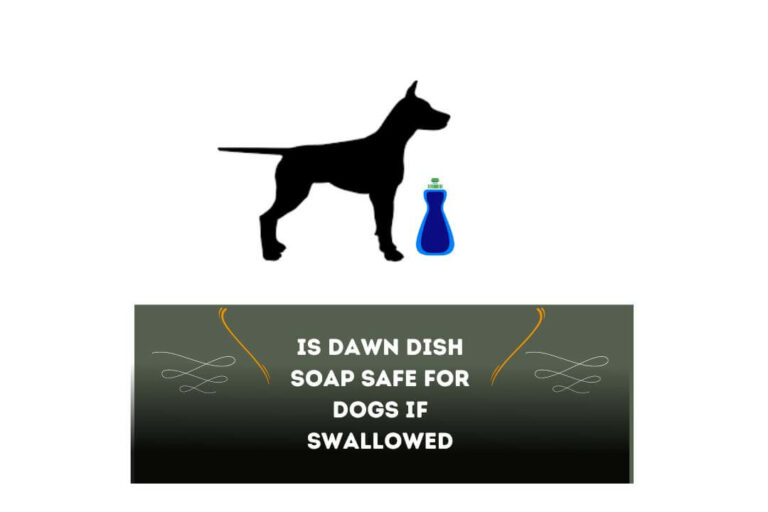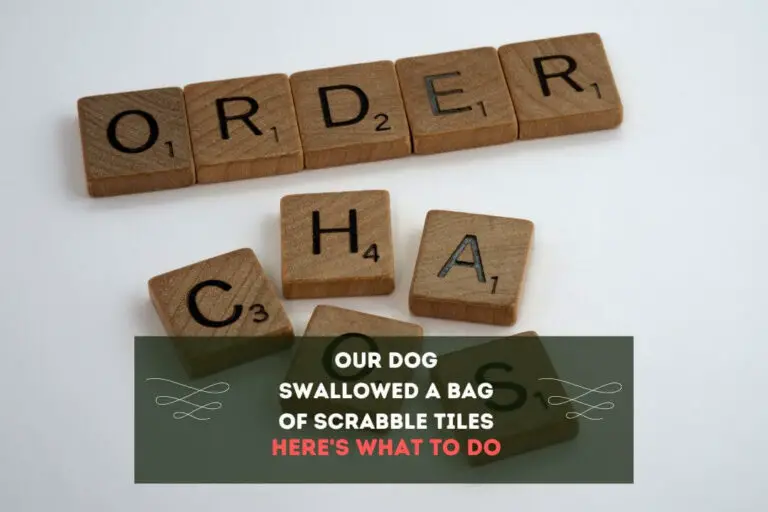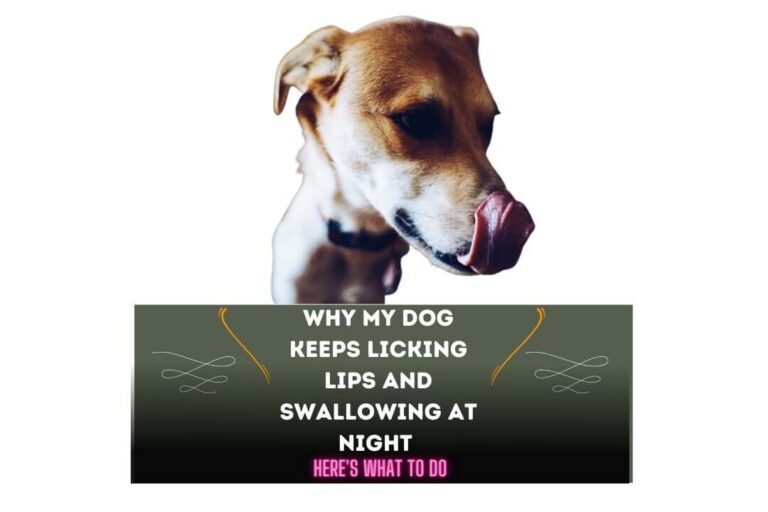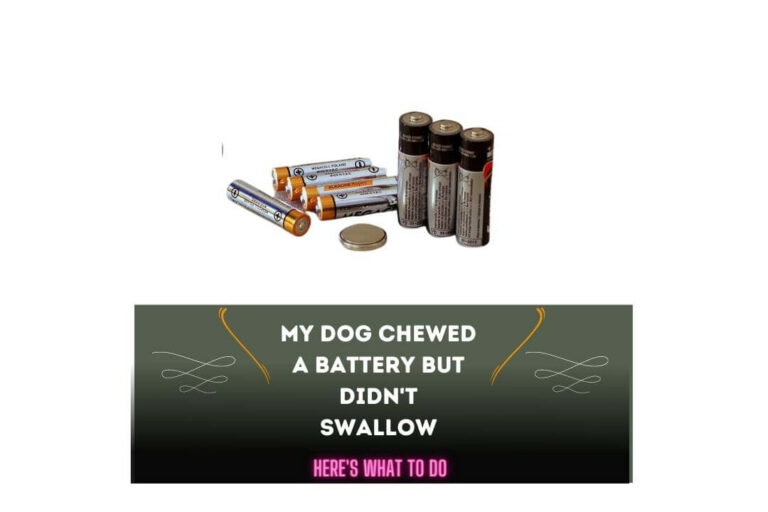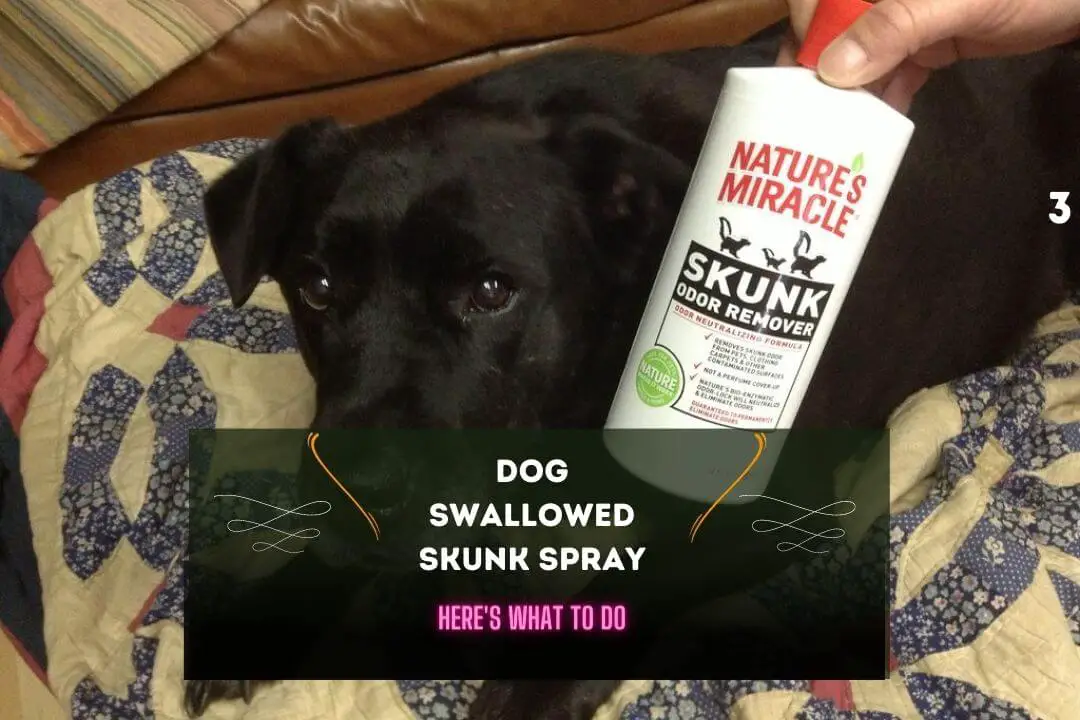
If your dog swallowed skunk spray and you’re wondering what to do, this guide is for you. You should note that Skunk spray is not only unpleasant but can also be harmful to your dog’s health. Skunk spray is known to irritate the eyes, nose, & throat in your dogs.
Besides that, your dog may also experience nausea & vomiting due to skunk spray ingestion. If your dog swallows skunk spray, it could lead to more severe symptoms like diarrhea, dehydration, and even anemia.
Therefore, if you want to know about immediate action you should take to ensure your dog’s safety, read this article thoroughly. Here, I’ll discuss what to do if my dog swallows skunk spray & how to prevent it from happening in the first place.
5 Things to Do If Your Dog Swallowed Skunk Spray
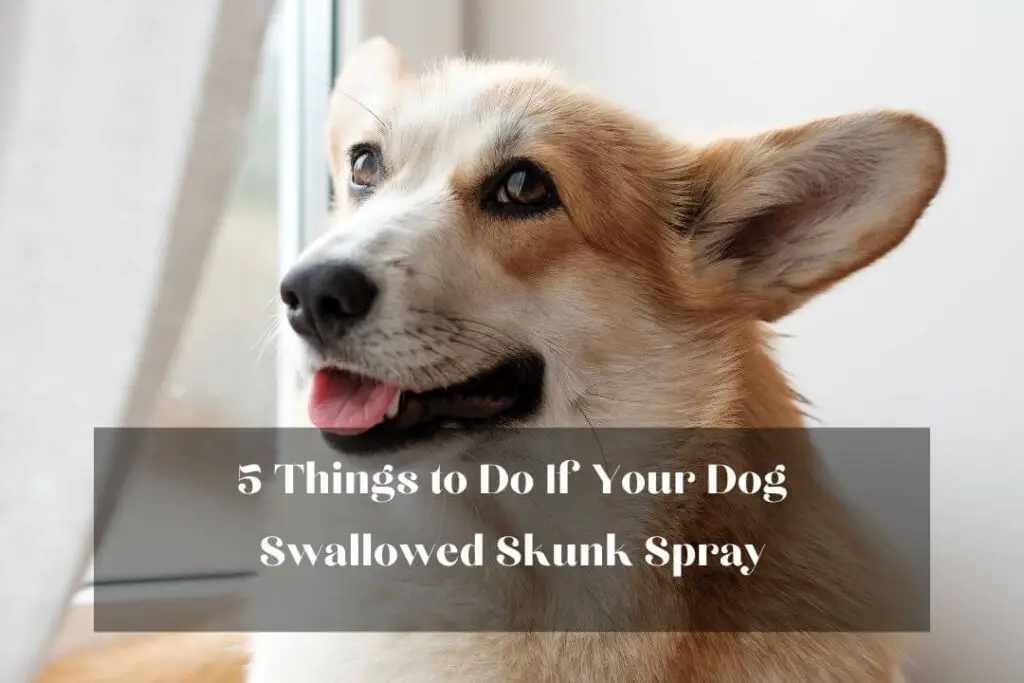
If your dog has swallowed skunk spray, here are five things you can do to help them:
- Remove the skunk spray from the fur
As you know, skunk spray is oily; it can potentially stick to your dog’s fur, causing unnecessary shedding while degrading its quality. To get rid of the skunk spray, your dog will start to leak its coat which can further cause more problems from ingestion.
Therefore, make sure that you attempt to remove as much of the spray as possible to prevent your dog from ingesting more of it. I recommend using a cloth or paper towel to wipe down your dog’s fur.
After that, you shouldn’t hesitate to give your dog a bath with skunk odor removal shampoo. Make sure you are using the shampoo and conditioner specifically designed for your dog breed and made from natural ingredients to prevent future complications.
- Keep your dog away from other pets and family members.
Not only can skunk spray be oily, but it also can be extremely potent, making it very harmful for your dog if ingested in high amounts. Therefore, ensure that you take preventive measures to keep your dog away from other pets and family members.
In addition to this, the smell of the skunk spray can be overwhelming not only for you but also for your dog. It can also cause problems like respiratory issues in your dog if you don’t take preventive measures to remove it.
- Observe your dog’s behavior for any signs of distress.
As I told you earlier, the smell of the skunk spray can be overwhelming and problematic for your dog. Therefore, it is important that you also keep a close eye on your dog for any signs of distress.
If your dog shows symptoms such as vomiting, diarrhea, or difficulty breathing, you must seek veterinary care immediately or take your furry friend to the nearest veterinarian.
- Contact your Vet or an emergency animal clinic.
If your dog has swallowed skunk spray, it’s best to call your Vet to let them know the situation and ask for precautions you should be taking while taking your dog to the clinic. It may cost you some time & money, but it’s worth visiting an emergency animal clinic immediately. Veterinarians can advise you on the best action based on your dog’s symptoms, age, size, and health conditions.
- Administer any prescribed treatment.
Make sure that you administer and follow the instructions of your veterinarian carefully. Your veterinarian may prescribe you some medications that can alleviate your dog’s symptoms & prevent any complications from occurring. Therefore, you must give your dog the medications recommended by your veterinarian as prescribed.
7 Potential Risks of Skunk Spray Ingestion in Dogs
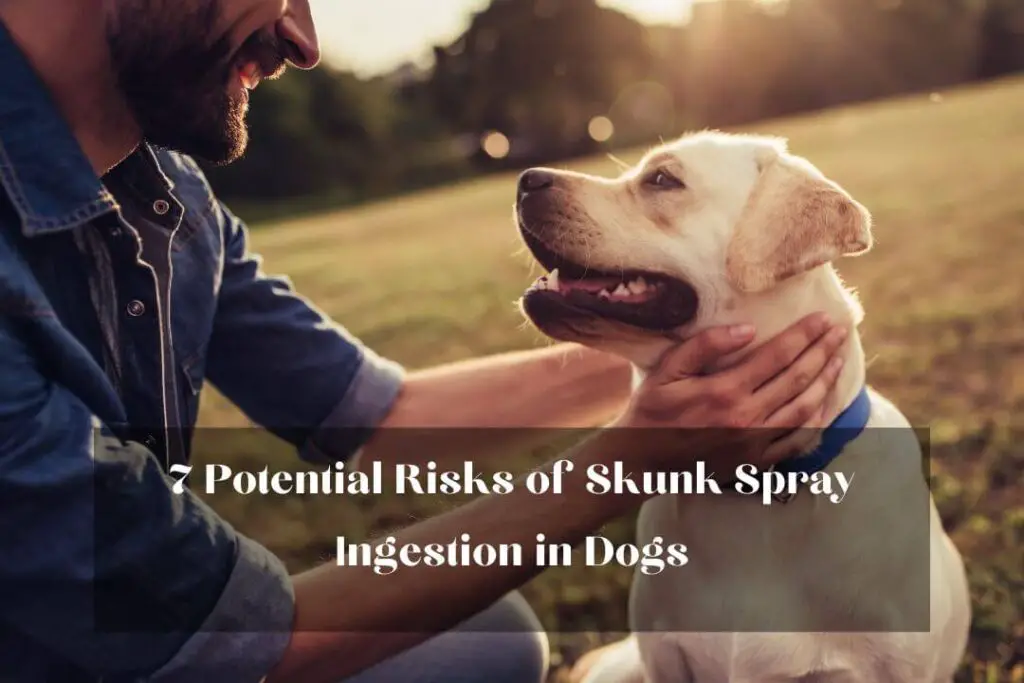
Eye Irritation and Damage
If you are wondering why the smell of the skunk spray is so overwhelming and nasty, then you’re not alone. It happens due to the compound called thiols in skunk spray, which is responsible for its strong odor.
If your dogs get sprayed in their face, their eyes can become irritated and even damaged. Plus, Texas A&M University also found that skunk spray can cause eye damage in dogs if you don’t act and treat it promptly.
The study also found that dogs with eye exposure to skunk spray are likely to develop corneal ulcers and other eye abnormalities, which you can experience worse.
Respiratory Problems
As I said earlier, Skunk spray can also cause respiratory problems in dogs if you don’t take precautions and act promptly. When your dog accidentally inhales the spray, you’re likely to notice them coughing, gagging, and having difficulty in breathing. This can also happen if your Dog Swallowed Squeaker or Your Dog Swallowed A Bag Of Scrabble Tiles
In severe cases, your dog may also experience respiratory distress and even pneumonia due to inhaling this skunk spray. If this is the case, your dog will require proper oxygen therapy and other supportive care. Sometimes a veterinarian also recommends hospitalization for a couple of days to monitor and assess the recovery process of your dog.
Gastrointestinal Distress
If your Dogs have ingested skunk spray, they are also at risk of developing gastrointestinal distress. Not only Skunk spray contains thiols compound, but also a variety of chemicals that are known to irritate a dog’s digestive system. This can also occur if your Dog Swallowed Collagen Stick.
If you notice your dog vomiting and suffering from diarrhea or loss of appetite, contact the veterinarian as soon as possible. In rare and severe cases, a dog can also suffer from dehydration and electrolyte imbalances due to skunk spray ingestion.
Dehydration
As I told you earlier, skunk spray can also cause dehydration in dogs if ingested in high amounts. The chemicals in this skunk spray are known to cause loss of electrolytes & fluids in dogs through vomiting and diarrhea.
I learned about this through a study published in the VCA Animal Hospitals. They found that skunk spray ingestion can lead to severe dehydration and electrolyte imbalances resulting vomiting in dogs.
Skin Irritation and Rash
As per a report from the Texas A&M University, skunk spray can cause significant anemia in dogs , making it problematic for people with an oversensitive immune system.
Thiols, the compound, is not only responsible for the skunk’s overwhelming odor but also has the potential to irritate a dog’s skin and cause redness, itching, & inflammation. In severe cases, skunk spray can cause skin ulcers & even secondary infections if you fail to treat your dog properly.
Anaemia
Anaemia is when a dog’s red blood cell count becomes low. Thiols in skunk spray can cause damage to your dog’s red blood cells, leading to anemia. Overexposure of Skunk spray to dogs can lead to hemolytic anemia, in which red blood cells are destroyed faster than they can be replaced. This can also lead to sudden death if you don’t notice it properly.
Also Read: Is Dawn Dish Soap Safe for Dogs if Swallowed?
Organ Damage
Lastly, Skunk spray exposure can damage your dog’s organs, like its liver, kidneys, and other organs. However, more studies & research are needed to be done to determine how the chemicals and compounds of skull spray pose a threat to dogs’ organs.
3 Tips to Prevent Skunk Spray Ingestion in Dogs
Keep Your Dog On A Leash When Outside
When walking your dog outdoors, it is important to keep them on a proper leash to prevent skunk spray ingestion. It will help you control where your dog goes and prevent it from venturing into areas where skunks are likely to present. In addition to this, it will also help you prevent your dog from chasing after you, which can result in the spray.
Keep Your Yard And Garden Clean & Clear Of Skunks
You should avoid keeping anything in your yard or garden that may look like a shelter or food for skunks. It is better to clean and clear off food sources from your yard and prevent keeping any trash cans or compost bins around it.
It is better to have a secure trash can to dispose of fallen fruits and vegetables. Ensure you also regularly remove all kinds of clutters and debris from your yard that may provide shelter for skunks.
Use Skunk Repellents Or Deterrents
Suppose skunks are in high population, particularly in your area or around your home. In that case, consider purchasing and using skunk repellent or deterrents that effectively keep them away from your properties.
There are lots of motion-activated sprinklers that can help you scare the skunks away from your properties. In addition, you are likely to find many types of commercial skunk repellent available online & offline that you can use to deter skunks. Make sure to use those made from natural ingredients like garlic & pepper.
3 Things to Expect at the Vet
Even though a vet visit can be a stressful experience for your dog and you, it is important that you know what to expect that may help you alleviate that stress. Therefore, make sure to learn what you are likely to expect at a vet clinic before you visit one.
- Diagnostic Tests: To determine the best course of action and the cause of your dog’s symptoms, your professional veterinarian may recommend a few diagnostic tests like blood work, urine analysis, and X-rays.
- Treatment Options: Once your Vet has determined the cause of your dog’s symptoms, they will discuss treatment options with you. That Treatment may include medication, surgery, or other therapies depending on your dog’s condition.
- Follow-up Care: Your Vet will likely recommend follow-up care after your dog’s initial visit. Therefore you should always feel free for additional appointments, medication, or monitoring at home. If you want to ensure that your dog receives the best possible care, follow your Vet’s recommendations as well.
3 Natural Remedies for Skunk Spray Odor Removal
Baking soda and vinegar solution
Did you know that Baking soda & vinegar are natural deodorizers that can help remove skunk spray odor? Yes, you must mix one quart of vinegar solution with 1/4 cup of baking soda and a teaspoon of dish soap.
However, make sure you’re using gloves to apply the mixture to your dog’s fur while avoiding their eyes & mouth. After applying it properly, you need to wait for five to ten minutes before rinsing it off with water so that the mixture sits properly.
Hydrogen peroxide & baking soda mixture
Another natural remedy that I often use for odor removal is a mixture of hydrogen peroxide & baking soda. You can also use it effectively to eliminate skunk spray by mixing one quart of hydrogen peroxide with 1/4 cup baking soda & a teaspoon of dish soap.
As I told you earlier, you must let the mixture sit for at least 10 minutes before rinsing it off with water and avoiding applying it to your dog’s eyes and mouth.
Lemon Juice & Water Mixture
Since lemon juice is considered to be a natural acid, you can also use it to neutralize this skunk spray overwhelming odor. However, ensure not to let the mixture set in for more than 5 minutes before rinsing it with water. To prepare the solution, mix one part of lemon juice with one part of water and apply it directly to your dog’s coat/fur.
Conclusion
After reading this article, you should know what to do if dogs swallow skunk spray. It would help if you visited the nearest veterinarian clinic as soon as possible for a proper diagnosis & assess the problem for the best course of action.
You should only treat your dog with someone if you know what you are doing. Without knowing the actual cause of the symptoms, you could do more harm than good for your dog.
It’s always best to call the veterinarian first and let them know about your and your dog’s situation. If you find this article helpful, then consider sharing it. Your share will help many people learn about the potential risk of dog swallowing spray.
Do check our other helpful guides on dog eating problems and solutions. See you in the next post, till then take care & goodbye.



